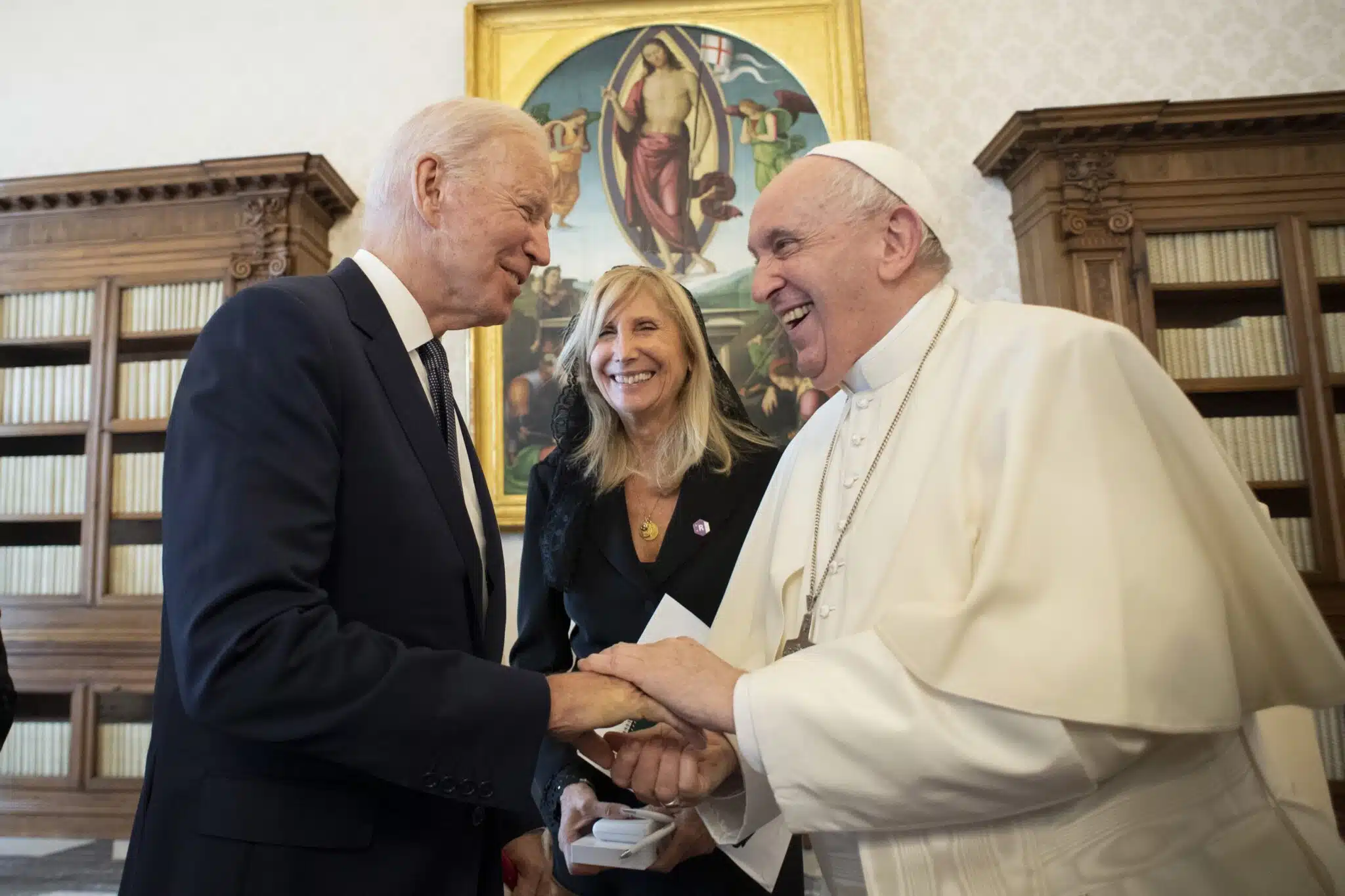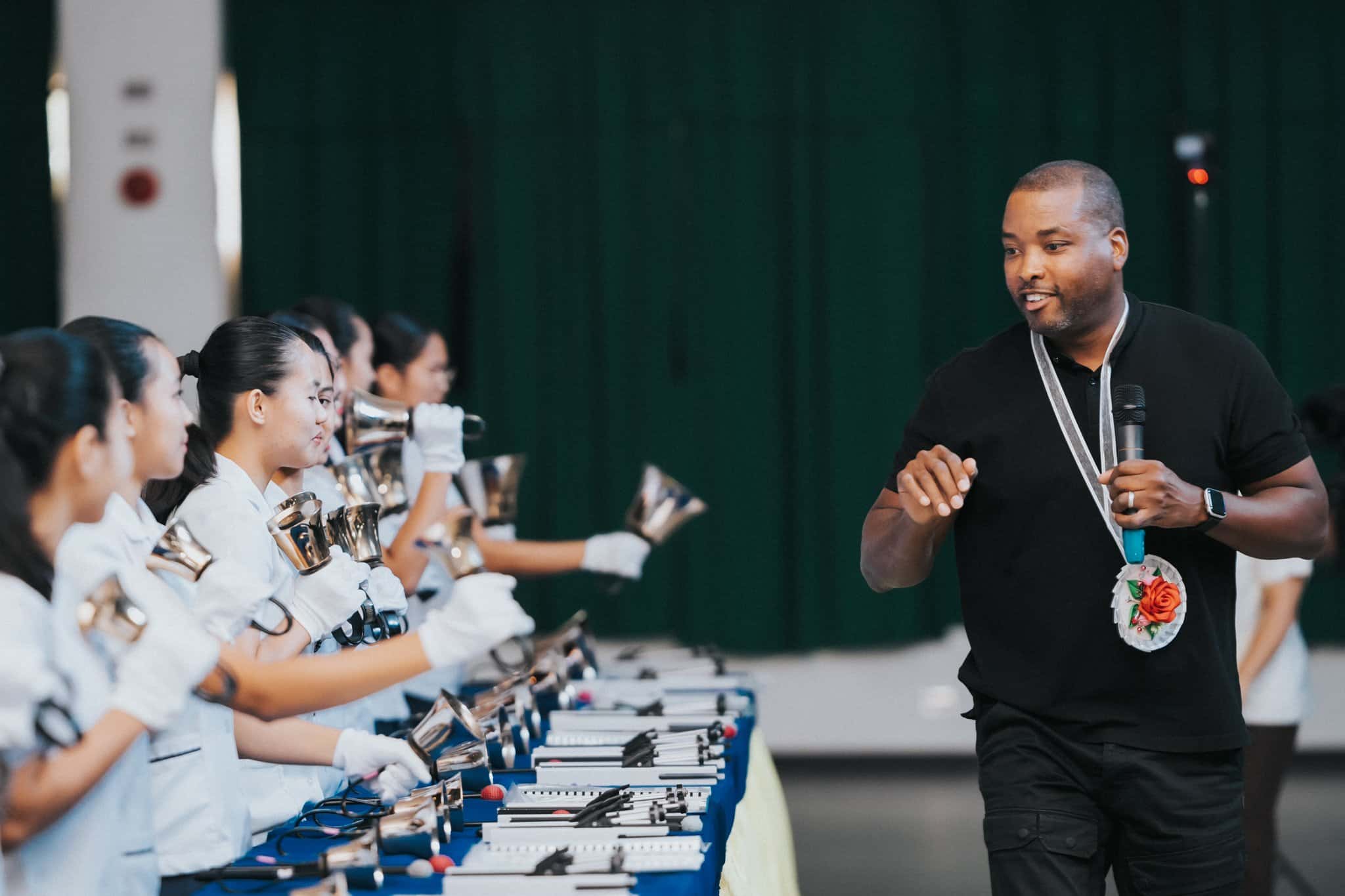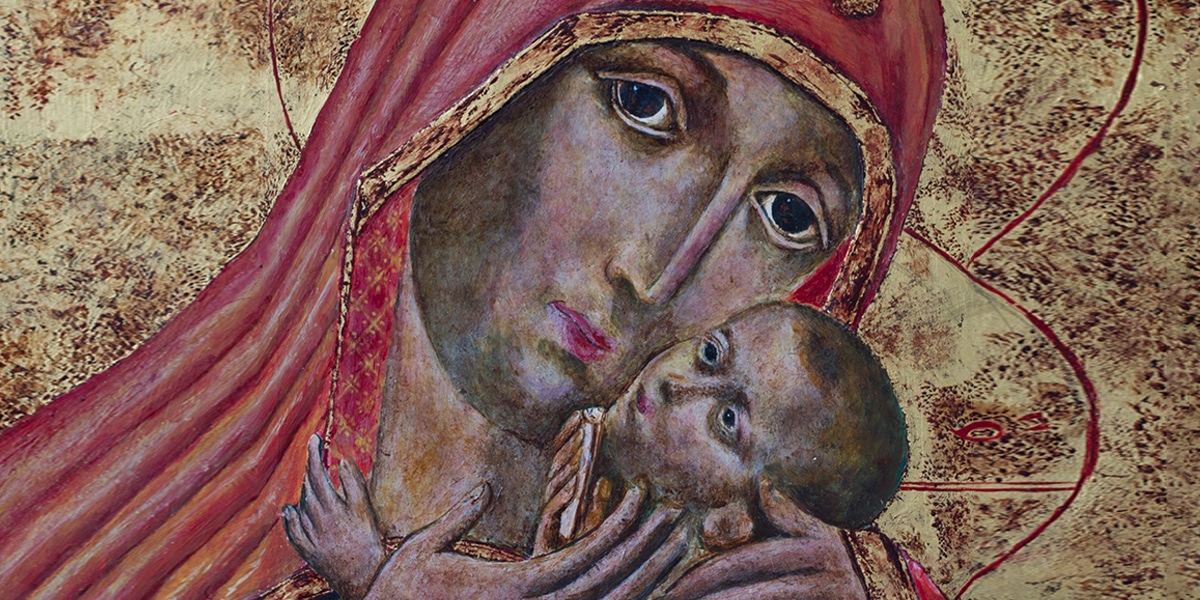A rich treasury of spirituality and service can enhance the later stages of life.
“What do you think you will be doing when you’re 80?” a first-year college student challenged her classmates at the beginning of a presentation about a woman her project group believed promotes the common good.
Reactions were immediate: “I’ll probably be lying in a bed in an old folks’ home.” “Someone will be pushing me down to dinner in a wheelchair.” And, finally, to spontaneous laughter, “I’ll be dead!”
Then the students projected a slide with a picture of their exemplar of the common good: a smiling, lively-looking Sister Helen Prejean. At age 80, she had just published her third book, a memoir, and was still at the helm of the Ministry Against the Death Penalty.
My students’ hilarity and overt ageism quickly dissipated. Amused but not surprised by this reaction, I wondered how my 18-year-old students might reinterpret me, their energetic teacher, if they realized I trailed Prejean in age by only 8 years. Would they be surprised, even shocked, to realize I could be their grandmother?
A Myriad of Challenges
Based on current data about aging, my teaching career could last for almost another decade. According to a 2021 report from the National Center for Health Statistics, taking into account deaths in 2020, life expectancy for males in the United States is 75.1 years and for women, 80.5.
Even though my peers and I are living more active lives than our grandparents, there is no escaping the reality of aging: the physical, psychological, and spiritual challenges that each year presents. Like those before us, we can, in the words of poet Dylan Thomas, “rage, rage against the dying of the light,” or we can openly assess the years we have lived so far to find meaning and peace in the years to come.
But limitations are real. In The Seasons of a Man’s Life, psychologist Daniel J. Levinson writes of an aging man: “Even if he is in good health and physically active, he has many reminders of his decreasing vigor and capacity. If nothing else, there are more frequent aches and pains.”
That description rings true for Mike Harmon, 80, of Cincinnati, who describes “how hard it is to get used to arthritis in my hands, as I struggle to button my shirt or unscrew a cap. And my hearing and eyesight are going down.” More worrisome is a recent diagnosis of smoldering myeloma, a bone marrow cancer.
Even without such a diagnosis, aging friends have to face their physical limitations. A few years ago, a longtime friend, Bonnie Finn, was chopping up fallen branches in her garden on a wintry day when she slipped off a wet rock and ended up with her wrist in a cast.
Among the mental declines are memory problems and aphasia. If you’re not familiar with that term, you probably have not reached age 65. Derived from a Greek word that means “speechlessness,” this is the inability to retrieve the right word, especially proper names. Sometimes it takes a spouse or friend to nail down the word. Or even a community: “Where two or three are gathered,” we might eventually come up with the name of a movie whose plot we all remember but whose title escapes us.
In realistically facing mental and physical diminishment, 66-year-old Mary Kay Fleming, PhD, notes that a valuable coping mechanism is a good sense of humor. The professor emerita at Mount St. Joseph University in Cincinnati says, “You can moan about aches and pains, or you can be more playful and laugh at yourself.”
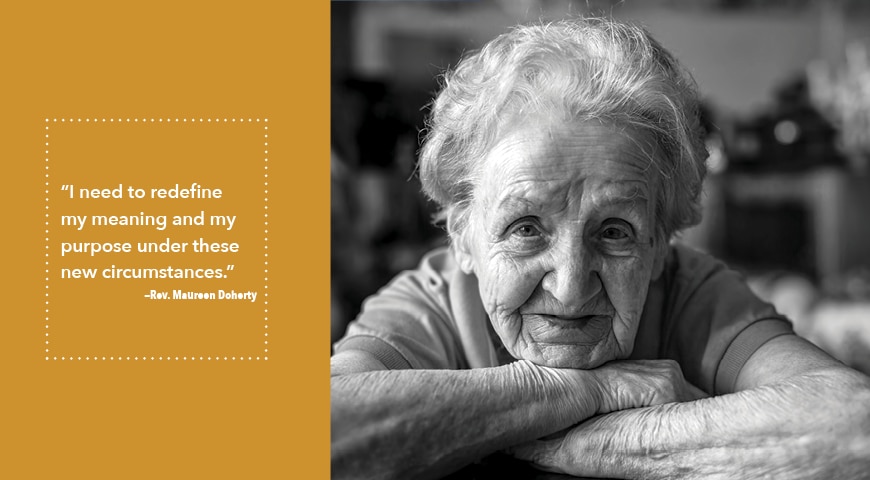
A Well of Spirituality
Coping with the challenges of aging doesn’t come naturally to everyone. However, Dr. Fleming mentions one well-documented predictor of our ability to “bounce back” from significant challenges: a deep spirituality. “Religious faith reminds us that there is more to life than our present ailments,” she explains. “We know we are not islands and that we belong to something larger and more meaningful.”
For Anne Marie Rusen, 75, religious faith—her own Catholic faith and her husband, Ted’s, devotion to the Russian Orthodox tradition—has been foundational to their 49 years of marriage. Until she retired recently, her life was one lived in service to her church—as an elementary school teacher, as director of ministerial development in a Kentucky diocese, and as a full-time pastoral associate for four small parishes near Dayton, Ohio.
Although Rusen’s relations with Church leaders have sometimes been strained, she vows, “I will never leave my faith.” In fact, she credits a Roman Catholic priest, Father Bob Monnin, the pastor of her young family’s parish in Vandalia, Ohio, with “shaping my spirituality and family life.”
Mike Harmon traces his spirituality to the deep faith of a mother and father who raised their 11 children in the Catholic Church and provided each a Catholic school education. From 1961 to 1969, he belonged to the Society of Jesus, where he was “strongly influenced by Jesuit spirituality: finding God in all things, practicing discernment, blending contemplation and action.”
His spirituality has helped him grapple with what he considers the biggest psychological challenge of aging: the loss of friends, several of whom died suddenly before he could reconnect. “As I age, I think about people who have gone on before me,” he reflects. “For the past year, I’ve been sort of depressed that people I have loved have died so suddenly.”
In one instance, he and Fran, his wife of 52 years, visited an 80-year-old friend in the hospital. As they entered his room, they discovered that this friend’s family had gathered when summoned by hospice to say their goodbyes. In a scene Harmon describes as “unexpected and unnerving,” he and Fran had arrived at the moment of their friend’s death. “I sat and held his hand as he died.”
Who Am I Now?
While each person ages uniquely, psychologists have identified life crises that are universal. Mount St. Joseph’s Dr. Fleming relies on developmental psychologist Erik Erikson’s eight stages of life when explaining to undergraduate students what aging looks like.
“The crisis adults face between the ages of 40 and 65 centers around leaving a legacy,” she explains, referring to Erikson’s seventh stage of development, which he termed “generativity vs. stagnation.” Dr. Fleming says that “in psychologically healthy adults, there’s a desire to mentor those who will survive you.”
The next stage, age 65 and beyond—called by Erikson “integrity vs. despair”—is the time to “look back at life and hopefully bring things to a point where you are happy with where you are in life,” says Dr. Fleming. “The challenge is not to be overwhelmed by regret, but to find a way to heal damaged relationships and be useful to those you are attached to, despite your physical limitations.”
The Rev. Maureen Doherty, an Episcopal priest, recently sold her house in Cedar Falls, Iowa, and moved into a senior independent-living facility with her spouse, Joan Farstad, also a priest, who is adjusting to Parkinson’s disease.
Their new lifestyle has been shaped by Joan’s “physical disabilities and diminished freedoms.” Instead of celebrating Eucharist within a parish, Rev. Doherty is sometimes asked to help with liturgies at the nursing home. With more isolation required by the recent pandemic, the couple feel fortunate to be able to be together in their apartment, sharing prayer each evening.
Another challenge for Rev. Doherty is giving up “knowing what I am doing every day when I wake up. I am the kind of person who needs to get up and move,” but by the nature of Joan’s illness, she needs to be with her many hours each day. “I am asking myself, What is the next part of my call here, in this town, in this residence? ” she reflects. “I need to redefine my meaning and my purpose under these new circumstances.”
According to Fleming, Rev. Doherty’s struggle is a perfect example of Erikson’s eighth stage: “Who am I now, in this condition/circumstance, and how do I make peace with it?”
Rusen has little trouble naming her biggest hurdle: starting over late in life when she and her husband moved to Powell, Ohio, to be closer to her husband’s doctors and several of her children and grandchildren. The move meant leaving friends and a parish where she had participated in a rich community and liturgical life. She hopes to find one that will feel like home and sustain her as she ages.
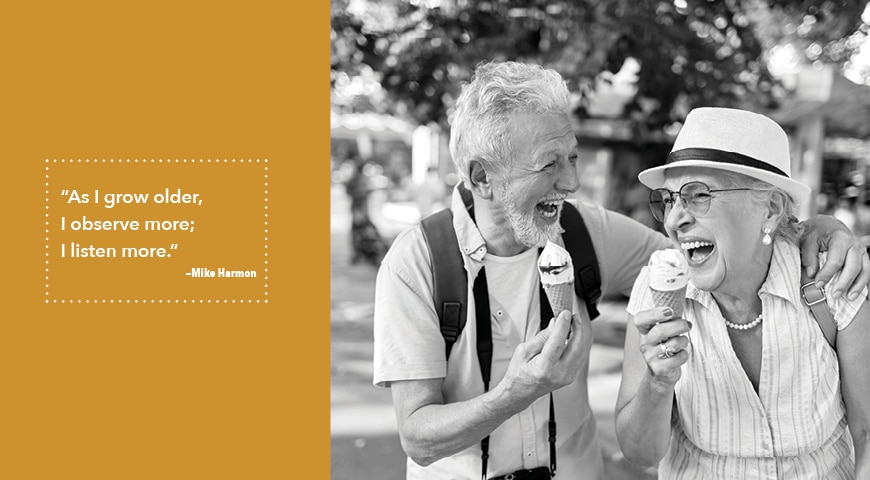
A Little Help from My Friends’
It’s not difficult to find public models of graceful and active aging just by browsing a newspaper or turning on the news: President Joe Biden, theologian Sister Joan Chittister, or actress Sophia Loren, who at age 87 recently starred in a miniseries. Several of those interviewed for this article need look no further than their age-mates to find inspiration as they navigate their final years.
Rusen looks to her husband, who has had two kidney surgeries and takes 27 medicines a day, “but never complains about his illness.” She admires his “spiritual depth. He is a good, good man, and I want to imitate him.”
Though Harmon falls short of canonizing his 80-year-old wife, he holds up Fran as a role model because she is “a person serious about her faith, forgiving, always open, never fearful, and focused on serving others.”
Rev. Doherty calls up the memory of the woman religious who helped her recalibrate her life. Each time they met, Rev. Doherty noted a gradual decline—from independent living to using a walker, then a wheelchair. Even though her friend was eventually confined to a bed in her community’s nursing facility, Rev. Doherty says, “She was sharp intellectually, and she kept having purpose through interacting with people.”
Reaching Out
Continuing to find meaning is one of the great tasks of the later years of our lives, says Dr. Fleming: looking outward, serving others, sharing wisdom even as physical energy begins to wane.
For Rusen, that means reaching out to people older than herself in her new neighborhood. “I am trying to learn the people I live near,” she says. “Some of their stories break my heart. After helping with 500 funerals in my ministry, I know how to read people. I plan to use the gifts I have developed over the years to help as I can.”
Although Rev. Doherty no longer ministers in a parish, she has responded to requests from local funeral home directors to lead weekly grief support groups. Despite restrictions on sizes of gatherings because of COVID-19, she has managed to find spaces to maintain these groups, which are so necessary as aging participants cope with grief in times of unbearable isolation.
Harmon, despite physical limitations, still serves a variety of causes. One role he cherishes is his position on the board of the St. Francis-St. Joseph Catholic Worker House for homeless men in the center of Cincinnati. Despite the limitations of aging, he can see an upside to them: “As I grow older, I observe more; I listen more.”
‘Be Not Afraid’
Even while pledging to reach out to others as long as they can, each of my interviewees is realistic about the spiritual task that awaits them as they envision their own deaths. That is one of the goals of aging, Dr. Fleming reminds us: “to come to terms with life, to find gratitude, to forgive, and not to be afraid of death.”
During a phone call with my friend Bonnie Finn near All Souls’ Day, we reminisced about those who have gone before us, friends we admired, many of them religious sisters. We named them with respect and love—Elizabeth, Joan, Margie, Paula—grateful for their impact on our lives, for being role models as we age. “They are the ones who made me unafraid of death,” she told me. “It’s like they are here with me. I talk to them about God and death, and they know, because they are there.”
When I asked Rev. Doherty, Harmon, and Rusen whether they feared death, each pointed to belief in something beyond their physical existence. Harmon expressed it this way: “I have no fears except that life is so beautiful and wonderful and I will miss it in the way I have experienced it, but I will still be part of the great stream of creation.”
As I reflect on my own “beautiful and wonderful” life, I am reminded daily of my mortality by reports of the still-rising death toll from the coronavirus. At the time of this writing, I have just finished a semester connecting with my students remotely, their disembodied faces and voices emanating from my computer screen. These students have many decades before they confront their own aging, but perhaps someday they will pick up a dusty copy of Prejean’s memoir River of Fire: My Spiritual Journey and tear up, as I do, when reading its afterword:
“My Sisters strengthen and inspire me to be generous in service and faithful in prayer, even when God seems to go dark. And now, as we age, they are teaching me how to die. But only when it’s time. For now, it’s all about riding the life river wherever it leads, full throttle, no-holds-barred.
“One thing I love about Jesus’ spirit is that he was always talking about really living, being truly alive. And as I experience it, that’s what the Jesus spirit in us does: quickens us to touch and enliven each other to life.”




